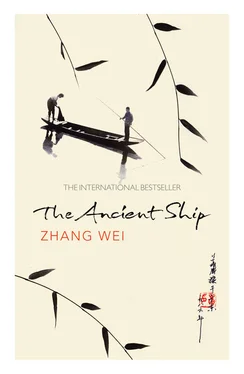Once dried, the noodles were laid out atop burlap sacks, piling up until there were little mountains of the white strands. A line of horse carts rode up, the drivers shouting for the women to load up. Jiansu drove his cart to the farthest pile of noodles, but instead of stopping he snapped his whip in the air and circled the drying racks. His bell rang out, and he whistled as he sped behind the women, frightening them. All but Naonao, who ran up to his cart and gestured. “Stop!” she cried out. Jiansu slowed down enough for Naonao to jump onto his cart. “Now make him run fast!” she shouted. His whip cracked in the air and away they went. Eventually, Jiansu drove up to a pile on the edge of the drying floor, where he and Naonao loaded up his cart. He was so much taller than Naonao, his legs so much longer, that he had to squat down when the two of them lifted up one of the piles.
“Be careful,” he said, “or I’ll toss you onto the cart along with the noodles.”
“Don’t be so cocky!”
Jiansu gleefully pushed his hair back, reached out, and wrapped his arms around the girl and the load she was carrying. Thump! He tossed them both into the cart.
“Wow, you’re strong!” Naonao said joyfully as she lay in the bed of his cart. “Stronger than the mighty Wu Song, and twice as bad!” The other women, drawn to the scene, clapped approvingly. One of them, a middle-aged woman, pointed and said, “Those two are having so much fun you’d think they were a couple!” That was met by shouts of delight. Naonao looked down from the cart and stood up high. “What the hell do you know!” she barked, pointing at the woman.
Zhao Duoduo came to the drying floor, as he did every day. The women were clapping and giggling when he walked by, and when they saw that that angered him, they quieted down. With a dark expression, he walked over to Jiansu’s wagon and glared at the two of them. “What are you looking at, old Duoduo?” Naonao said. “You don’t scare me.” Duoduo smiled, showing his front teeth. “I know I don’t. You scare me. I just came to tell you that starting tomorrow you’ll work inside. You’ll make more money there.”
She pouted. “You won’t scare me there either.”
Duoduo watched her jump down off the wagon and narrow her eyes as she tried to catch her breath. A drop of sweat fell from her neck to the ground. Then a commotion behind him caught Duoduo’s attention. He turned and saw a bunch of kids with baskets, shouting and chasing after Hanzhang, who was waving her rake in the air. “Damn!” he cursed as he went over to see what was happening. The kids were digging frantically in the sand with their grimy hands, which entered and emerged from the sand at about the same time, clasped together; if no noodles came out with them, the fingers separated for the next try. The kids’ eyes were fixed on the little spot of ground in front of them, and they saw nothing else. When Hanzhang shouted something, the kids looked up to see, just as a large foot stepped down on their hands. It was big enough to bury most of them. Young eyes traveled up the leg. Discovering it was Duoduo, they burst into tears.
“You little thieves!” he cursed as he looked into each of their baskets.
“Uncle Duoduo…,” Xiaokui called out. He bent down and pinched Leilei’s ear without looking at the woman behind him. The boy’s yelp of pain was followed by an explosion of tears; he dropped his basket. The foot lifted up off the hands, which returned quickly to their owners. Then it kicked out backward, knocking over Leilei’s basket and spilling the noodle pieces back onto the sand, like embroidery needles. The kids stared wide-eyed as Xiaokui stumbled backward and sat down on the sand with a thud.
For a long moment the drying floor was silent before Hanzhang decided to go over and scoop up Leilei’s noodles for him. Duoduo glowered at her as she set down her rake. “Stop right there!” he shouted. Hanzhang froze. By then the children were all crying. The other women were off a ways, loading the wagon, where the horse announced its presence between the shafts with loud whinnies. The sound of a bell added to the confusion, that and the curses of the man directed at his animal. From where he stood, Sui Jiansu took a look at Zhao Duoduo, then walked over, stood beside Hanzhang, and lit his pipe. He glared at Duoduo as he smoked.
“What the hell do you want?” Duoduo asked, his anger building. Jiansu just puffed away and said nothing. “Well?” Duoduo asked, his voice thick.
“Second Brother!” Hanzhang said softly. But still Jiansu said nothing. After casually smoking all the tobacco in his pipe, he tapped the bowl to empty the ashes.
Duoduo’s glance shifted from Jiansu to the children. “Who the hell do you think you are at your age? Make me angry and you won’t live to talk about it!” He turned and walked off.
Hanzhang grabbed Jiansu’s sleeve and said softly, “What’s wrong, Second Brother? What is it?”
“It’s nothing,” he said, grunting derisively. “I just wanted him to know he’d better start treating members of the Sui clan with respect from now on.” That elicited no response from Hanzhang, who looked across the river at the old mill. Evening mist rose from the river, through which the silent mill gave anyone who saw it an uneasy feeling.
The old mill stood silently, but if you listened carefully, you heard a low rumble, like distant thunder, settling over the wildwoods beyond the riverbanks and into the autumn sunset. The millstone turned slowly, patiently rubbing time itself away. It seemed to put people increasingly on edge; maybe one day, sooner or later, it would infuriate the town’s young residents.
The young heir of the Li clan, Li Zhichang, fantasized that he could find a way to turn the mill by machine. Not much given to talking, he entertained a host of fantasies in his head. And when he related one of them to Sui Buzhao, his only confidant, the two of them would get excited. “That’s an interesting principle!” the older man would say with an approving sigh. Li Zhichang’s favorite pastime was reading up on math and physics, memorizing formulas and principles. Sui Buzhao never could remember the things Li Zhichang told him, but he was drawn to the word “principle” and would submit these principles to his own unique interpretations. He urged Li Zhichang to share his plans for revamping the mill with a geological survey technician, also surnamed Li.
“Can do,” Li replied. So, by putting their heads together, the three men came up with a workable plan. Now all that remained was to build and install the machinery. Belatedly, it occurred to them that they needed Zhao Duoduo’s approval before anything could be done. So Sui Buzhao went to see him.
At first Zhao said nothing. But after thinking it over, he said, “Go ahead, mechanize one of the mills. We’ll give it a try.”
Li Zhichang and Sui Buzhao were thrilled, as was Technician Li. They went right to work. Any parts they needed they had made in the town’s metalwork shop, billing the factory for the costs. The last item was the motor. Zhao Duoduo gave them the least workable diesel pump in the factory. Now the question was, which mill should they target for the new equipment? Sui Buzhao recommended the one run by his nephew. Baopu, who seemed pleased by the news, called his ox to a stop, unhooked the tether, and took it out of the mill.
Work began. For days the mill was the scene of bustling activity, observed by crowds of local residents. Sui Buzhao was in perpetual motion. One minute he’d be bringing oil or a wrench, the next he’d be moving the gawkers back. Finally, the motor sputtered to life, and when it was running at full speed, the millstone began to turn. The rumble was louder than usual, as if thunder had drawn near. They added a conveyor belt to feed the soaked mung beans into the eye of the millstone at a constant rate. The liquid poured out and flowed down the revamped passage into the sediment pool. It was immediately obvious to everyone that the age of feeding the beans with a wooden ladle had come to an end. But someone was still needed to spread the beans evenly on the belt, so Baopu continued sitting in the old mill, as before.
Читать дальше












